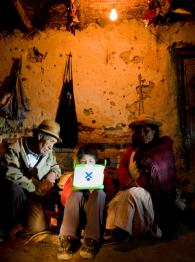
About the Project
This project is one of the 2014 WISE Awards finalists.
Una Laptop por Niño (One Laptop per Child) aims to transform Peruvian education by improving equity and quality of life for Peruvian children, beginning in rural areas where the quality of education has traditionally been poor.
Context and Issue
A January 2007 census evaluation of 180,000 Peruvian basic education teachers showed that 92 percent of them lacked basic math reasoning skills, 62 percent of them did not read at 6th grade level, and 27 percent were at levels of zero or below. After 200 hours of remedial education run by local universities’ faculties of education, 13 percent of teachers were still at the same level of zero or below.
Solution and Impact
The program therefore is designed by the government to improve the average quality of teachers at public schools would require at least 10 years to complete. After a small pilot program with 100 laptops in three locations, the project initially targeted 10,000 single-teacher schools where 220,000 students and teachers perform at very poor levels in key curriculum areas.
The Ministry of Education has already distributed one laptop computer – complete with educational software and contents, and an offline version of an educational portal that gives users access to secure asynchronous Internet navigation – to each of these children and their teachers. Subsequently the project was extended to six million public school children through a Technology Resource Center Strategy (almost one million computers, servers, projectors and 92,000 robotic kits). Since then, the students have shown a dramatic increase in their interest in school work, a reduction in absenteeism and improved personal relationships.
The central idea of the project is that children are natural learners and will take advantage of whatever digital resources they receive, even if the teaching they receive is not of good quality. At present, a good teacher will be a major advantage for the project goals but children do not need to wait until more skilled teachers become available.
In terms of impact, the project has had the following results:
- Dramatic increase in computer skills;
- Four to six months’ advantage over 15 months in cognitive skills;
- More critical skills and improved intrinsic motivation towards school work.
Future Developments
When the new government took office, following a long national tradition, the project was called into question. However, the technical and pedagogical team remained in place and the efforts were directed towards improving laptop usage rather than coverage. The national educational portal has been improved and many self-development options for teachers have been included. An investment project is under development to continue the project over the next five years.


